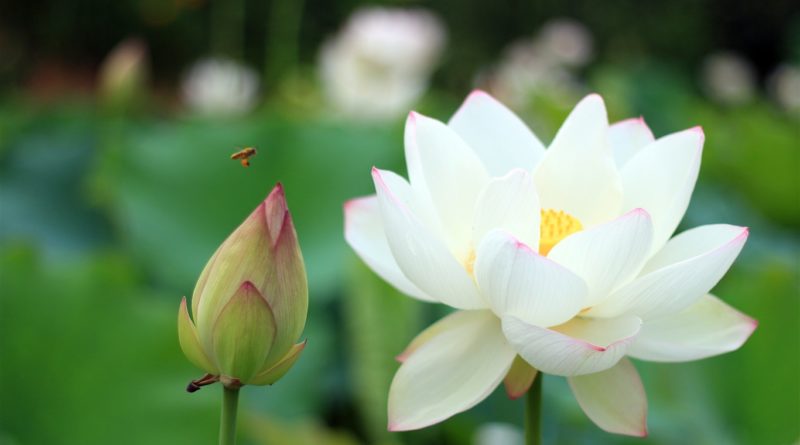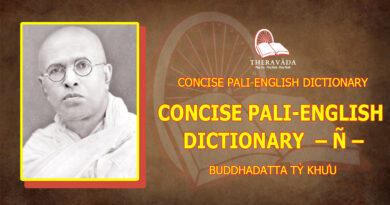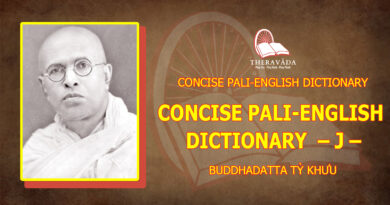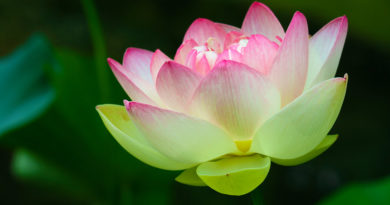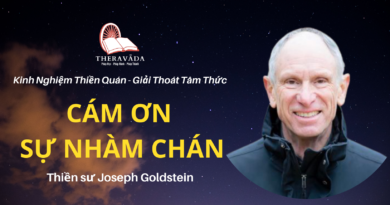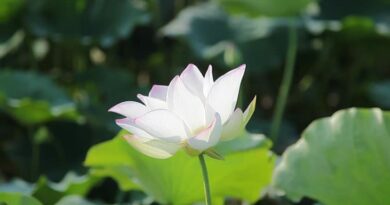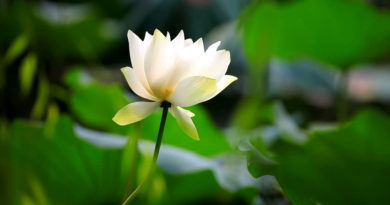Discourse On The Dhammadāyāda Sutta – Phần 2 – Introduction To The Sutta
Phần 2 – Introduction to the Sutta
– A Discourse on the Dhammadāyāda Sutta
– Prologue
– Introduction to the Sutta
– Pāḷi Text of the Sutta
– Inheritance of Material Goods
– Inheritance of the Dhamma
– Simile of Two Monks
– The Venerable Sāriputta’s Question
A Discourse on the Dhammadāyāda Sutta
Prologue
Sāsana Yeikthā has been a Vipassanā meditation centre since we came here in 1949. At the beginning there were not many buildings to speak of. A monastery where I dwelt formerly, a dining hall that was not large enough to accommodate more than forty monks at a time, four single wooden dwellings, workers’ quarters, these were the only buildings that existed at that time. In place of this auditorium there was a make-shift lecture hall, which witnessed the formal opening of the meditation centre in December 1949.
The centre started with twenty-five meditators. The female meditators were lodged in thatched bamboo buildings on the lower ground of the Yeikthā compound while the monks and male meditators had to stay in a similar building on higher ground. The number of meditators has increased every year. Many new buildings have been constructed. At the time of writing there are over three hundred meditators all year round, increasing to fifteen hundred in summer. There is now no vacant land for new buildings.
Twenty-one years have passed since the opening of the meditation centre at Sāsana Yeikthā. In 1950 I told my disciples to hold an annual meeting at which all the meditators who had practised insight meditation at the centre could gather to renew their faith and enthusiasm, and for closer contact and affinity leading to the suffusion of loving-kindness in acts, words, and thought.
Then Sir U Thwin, the founder of Sāsana Yeikthā, suggested that it would be good to make the meeting also an occasion for exhortation and homage. I had such an idea too, but I did not tell anyone about it lest I should lay myself open to charges of egoism and self-glorification. So in accordance with Sir U Thwin’s suggestion we now call it the annual exhortation (ovāda) and homage day.
It is my duty to exhort the bhikkhus, meditators, and lay disciples who are present on this occasion. This year I propose to give an exhortation on the basis of the Dhammadāyāda Sutta that formed the subject of my discourse last year. I wish to talk again about this sutta because it is an important teaching of the Buddha. King Asoka mentioned some teachings of the Buddha repeatedly in his inscriptions because they were profound and worthy of serious consideration. Likewise, I propose to give another talk on the Dhammadāyāda Sutta because of its deep significance and special relevance to modern times. If the monks and laymen follow this teaching, it will benefit them and contribute to the spread of the Buddha ’s teaching.
Introduction to the Sutta
The Dhammadāyāda Sutta was delivered by the Buddha while he was residing at the Jetavana monastery in Sāvatthi. The Buddha taught it because in those days some monks were excessively attached to material goods. Such attachment naturally leads to deficiency in respect of morality, concentration, and wisdom and this discourse serves as an antidote to such spiritual decline.
Pāḷi Text of the Sutta
“Dhammadāyāda me bhikkhave bhavatha mā āmisadāyāda atthi me tumhesu anukampā ‘kinti me sāvakā dhammadāyāda bhaveyyum no āmisadāyāda.’
“Monk! You should inherit the Dhamma from me. You should not remain content with the inheritances of material goods.”
Here the Buddha expressed his wish in unmistakable terms and stressed the importance of the heritage of the Dhamma just like the parents giving instructions to their beloved children before they pass away. Some people fear lest on their death their children by the second marriage should come off second best in the division of inheritance with the lion’s share going to the older offspring.
So they take steps for the equitable distribution of their wealth or otherwise make secret provisions for their younger children. Likewise, the Buddha instructed his disciples to inherit the Dhamma that was the best thing that he had for them. Although he addressed the monks in this discourse, his instruction was also meant for the lay followers who had implicit faith in him.
Inheritance of Material Goods
People usually show great enthusiasm when they inherit the material possessions of their deceased parents. Nobody wants to sacrifice his interest for the sake of his brothers and sisters. Some are so consumed by greed that the death of a man often means the breakup of his family and the beginning of resentment, quarrels, and enmity among his offspring. This is a matter of common observation as regards the lay people, and the same may be said of the monks who show no less enthusiasm over the inheritance of material goods. The death of a famous Sayādaw is often followed by a scramble among his disciples who lay claim to his possessions on the basis of his alleged bequests, close association, or the rights of his religious sects. These claims may be legal or illegal from the standpoint of the Vinaya Piṭaka. Under the British government there were many disputes over the inheritance of monasteries and some lay Buddhists had to spend so much money for their law-suits that they were finally reduced to penury. Such legal battles are still being fought in modern times.
In response to the request of a layman I once sent a monk to reside at his monastery. Later, a monk at that place wrote to me, asking me to recall the resident monk as the monastery was declared as the property of the Saṅgha in the time of his teacher. So I had to send a reply saying that the monk in residence had been sent not for the possession of the monastery, but for the spiritual uplift of the local people. I wrote that we urge our disciples to inherit the Dhamma not material goods, and that he should deal only with the layman concerned in connection with the monastery. Now the monk whom I sent there is in another place; he has declined the invitation of the layman whose monastery is still vacant.
Again we were once asked to recall a monk whom we had sent to a place at the request of the local people. There was a monk who owned the monastery and in fact he had welcomed our monk. We have nothing to do with such disputes which concern only the lay people. Moreover, we have had to ignore some meditation centres which were forcibly occupied by those who could not teach insight meditation. We do not bother about such cases and leave them entirely in the hands of the lay people concerned. All over the country disputes over the ownership of monasteries are rampant. In the context of the Dhammadāyāda Sutta this state of affairs should be a cause for deep concern, and we are afraid it has discredited the Saṅgha in the eyes of the lay Buddhists.
Many monks are preoccupied with the pursuit of food, robes, monasteries, money, fame, popularity, etc. Some seek material goods by all possible means even in contravention of the Vinaya rules. Such frantic pursuit of material goods means decline in the practice of the Dhamma and so it runs counter to the teaching of the Buddha.
Inheritance of the Dhamma
Now to continue the Pāḷi text in the Dhammadāyāda sutta.
“Atthi me tumhesu anukampā kinti me sāvakā dhammadāyadā bhaveyyum no āmisadāyadā”ti.
“My disciples, I have compassion for you. So I am concerned about how you should be heirs, not of material goods, but of the Dhamma.”
The Buddha was motivated by compassion when he urged his disciples to pay serious attention to the inheritance of the Dhamma. Not that he wanted them to deny themselves proper food, robes, etc., but what he warned them against was craving for these things at the expense of the holy life.
The Dhamma that the followers of the Buddha should seek is of two kinds: the true or supreme Dhamma and the intermediary Dhamma and the Buddha urged his disciples to cherish both. According to the Commentary, the supreme Dhamma comprises the four kinds of path knowledge — Stream-winning, Once-returning, Non-returning, and Arahantship — the four fruits corresponding to the four paths and nibbāna. These are nine supramundane Dhammas that one can realise only on the basis of the Buddha’s teaching. The attainment of the four paths means the attainment of the fruits and nibbāna. One who attains the first path also attains its fruit and one is then on the threshold of nibbāna. The meditator at this stage is then wholly free from the defilements that lead to the lower realms. He will be reborn in the human or the celestial realms and he will not have to face sickness, death and other sufferings for more than seven existences. So the Buddha urged his disciples to strive for at least this lowest grade of the heritage of Dhamma.
When the meditator attains the path and fruition of Once-returning he or she is subject to no more than two rebirths in the human and celestial realms. Again when he or she realises the path of Non-returning, he or she is assured of total liberation from all suffering inherent in the human and celestial realms. The Non-returner is destined to land in the Brahma world. Then for the meditator who attains Arahantship, it means complete extinction of all suffering. The Buddha urged his disciples to practise the Dhamma till the attainment of this supreme goal.
The heritage of this supreme Dhamma is primarily meant for bhikkhus. For the lay followers of the Buddha who cannot live up to his teaching, there is the intermediary (pariyāya) Dhamma which the Commentary describes as alms-giving, a good moral life, observance of the Uposatha, offering of flowers, etc., in memory of the Buddha at pagodas, listening to the Dhamma, and so forth. Doing these wholesome deeds leads to rebirth in the human and celestial realms where through hearing and practice of the Dhamma one finally attains nibbāna. In other words, this intermediary Dhamma is a means to the attainment of the supreme Dhamma.
So every true disciple of the Buddha who has faith and zeal should strive for the four paths, the four fruitions, and nibbāna in this very life. If one cannot attain this object, one should practise alms-giving, morality, etc., not merely for happiness in the human and celestial realms, but for the attainment of nibbāna. In other words, one should seek the heritage of both the supreme Dhamma and intermediary Dhamma.
The Buddha does not want his followers to have craving for material goods. Here the material goods which should not be the objects of attachment are of two kinds. The first kind is the four requisites of life for monks: food, robes, dwelling and medicines. Once a person joins the Saṅgha, he is assured of these requisites. It is easy for him to get them. Nowadays a monk can even get foreign medicines although for ordinary people they are hard to come by. Some monasteries are bigger and far better than the tumbledown dwellings of many lay people. These requisites are easily available thanks to the faith of the lay Buddhists, but the Buddha does not want the monks to become attached to them.
Yet there are monks who seek to acquire material goods by any means. Some pretend to be Arahants and some claim occult powers that are supposed to enable them to advance the material welfare of their followers. To exploit the people in this way for selfish ends is, of course, a flagrant violation of the Vinaya rules binding on all bhikkhus.
The heritage of material goods in the form of the requisites of life concerns only the bhikkhus. As for the laity, there is the other kind of material heritage in the form of higher life in the human and the celestial realms. Many people practise alms-giving, morality, etc., in the hope of attaining heavenly bliss or higher rebirths on earth. Such acts of generosity, morality, and mental development will not lead to insight-knowledge or nibbāna. Nor will they guarantee permanent deliverance from the dangers of the lower realms. On the contrary, the desire for higher rebirths in the sensual worlds of deities or human beings means attachment to material goods that is harmful to moral life and so one is likely to land in the lower realms where one is overwhelmed by unwholesome kammas.
Even if one attains higher rebirth in the celestial or human realms through good kammas, one is bound to suffer old age, sickness and death. Hence the second kind of material heritage, too, is inferior, undesirable, and not worth striving for. We should not, therefore, set great store by the other worldly bliss, let alone the four requisites.
The Buddha warned his disciples against these temptations out of compassion for them, for he saw how attachment to material goods had led some monks to the lower realms as in the case of Bhikkhu Kapila in the time of Kassapa Buddha, who, because of his greed, had to suffer greatly in hell. The Buddha was also aware of old age and other evils that lie in store even for those who do good deeds, but who crave for sensual pleasure. He knew, too, how the Venerable Mahākassapa, Sāriputta and other disciples acquired psychic powers and wisdom through the diligent practice of dhamma. Without the heritage of the Dhamma we cannot rule out the possibility of rebirth with all its attendant sufferings.
Suffering is inherent in every kind of existence in the form of sickness, old age, and death. We need not dwell on the miseries of old age that plague many elderly people around us. Sickness is a universal evil and hospitals are full of patients whose sufferings cannot help but move us to pity. Even a man who is quite healthy throughout his life has to face a painful disease before his death. As for death, it is also inevitable in the celestial realms. If we do not strive for the path, its fruition, and nibbāna, we are in for repeated afflictions with these evils in one existence after another. In addition, there is the dangerous potential for rebirth in the lower realms.
According to the Commentary, the four lower realms of animals, hells, hungry ghosts, and jealous gods are like private dwellings for unmindful persons. Here unmindfulness means failure to guard oneself against evil kammas in words, deeds, or thought and against excessive indulgence in sensual pleasure.
It also means failure to do good, to practise generosity, morality, and mental development. By and large we dwell at home although we may occasionally spend a day or two at another place. Likewise, the unmindful person spends most of his or her time in the lower realms. Rebirths in heaven or on earth are few and far between just like our occasional visits to another man’s house. This is the usual lot of ordinary people. The Buddha was deeply concerned about the future of his followers, hence his insistence on the need for the heritage of the Dhamma.
The Buddha also said that he and his disciples would be criticised by others if they cared only for material goods and failed to live up to his teaching. For example, society will blame us if the behaviour of our children leaves much to be desired. So too the people in the time of the Buddha would hold him responsible for the failings of his followers. They would have said that despite his claim to Omniscience the Buddha was unable to discipline his followers effectively. On the other hand, if they were wholly committed to the Dhamma, the Buddha would surely earn the praise of the people.
It is not easy to become a true disciple of the Buddha. Many people have an unwavering faith in the Buddha. Some have even joined the Saṅgha and devoted all their time and energy to the holy life. Yet for all their adoration of the Buddha and their zeal and sincerity in the practice of generosity, morality, etc., there is always the possibility of falling into the lower realms. For it is only the supreme heritage in terms of the path, its fruition, and nibbāna that will ensure real liberation. Hence the Buddha’s deep concern for the spiritual welfare of his disciples.
Simile of Two Monks
Suppose, says the Buddha, there are two monks who come to see him just as he has finished his meal. Having come from far, they are tired and hungry. The Buddha says that he has surplus food that has to be disposed of and that they may eat it if they like. One of the monks remembers the Buddha’s teaching and so he resolves to spend the night in a weak and famished condition, but the other monk eats the food, thus restoring his energy and satisfying his hunger. The Buddha declares that the first monk who rejects the food is more worthy of praise and honour than his companion.
In the eyes of ordinary people there is no reason why the other monk should be blamed. He makes a good use of the food which might otherwise have gone to waste, and by eating it he gains some vitality that makes him zealous and vigorous in the practice of the Dhamma. In fact, the Buddha does not criticise him, but he declares the first monk to be spiritually superior in that his self-denial is conducive to contentment, lessening of defilements, exertion of effort and easy maintenance of one’s life.
Buddhism teaches us to control our desire. Unbridled desire leads to frantic pursuit of material objects or the heedless consumption of food, etc. Such wrong actions will be unthinkable for the monk who restrains his desire to the point of declining the Buddha’s offer of food. He will be able to overcome evil desires and cultivate contentment for his spiritual uplift. Moreover, it will be easy for his lay supporters to serve his physical needs.
Some monks complain about the kind of food, etc., provided by their lay followers. Once there was an elderly monk in Mawlamyaing township who had to be served with chicken curry every day. Even when he went on a journey his lay attendants had to take his favourite food along with them. Again the monk who has the will to forgo even the food offered by the Buddha will not get disheartened in the face of hardships and privations. His memory of the self-denying experience will rouse him to assert his will, exert his energy, lessen his defilements and minimize the necessities of life.
The simile of the two monks shows the way in which the Buddha teaches his followers. His approach was very gentle and it is like that of the kind-hearted parents who have to discipline their children. He was motivated by great compassion that makes him worthy of reverence and emulation.
The Venerable Sāriputta’s Question
After stressing the need for the heritage of the Dhamma, the Buddha left the assembly of monks. Then Venerable Sāriputta raised the question as to how far the disciples of the Buddha practised or failed to practise detachment that forms the chief characteristic of the Buddhist way of life. In response to the request of the bhikkhus, Venerable Sāriputta answered the question as follows:
The Buddha’s way of life is based on detachment (viveka) in respect of body, mind, sensual pleasure, etc., but some of his disciples did not follow his example and practise detachment. The detachment of the Buddha is of three kinds; physical (kāya-viveka), mental (citta-viveka), and detachment from existence (upādhi-viveka).
Physical detachment means living in solitude. Instead of seeking company, the Buddha usually lived alone. Solitude is conducive to peace and happiness. The Buddha spent his time in solitude except on occasions when it was necessary to communicate with others, for instance, when he had to teach them.
Mental detachment means the attainment of absorption (jhānasamāpatti). The Buddha was perfectly qualified to attain all of the various stages of absorption.
Detachment from existence refers to the extinction of the four substrata (upādhi) of becoming that cause suffering. In other words, it means nibbāna. Nibbāna is devoid of 1) sensual objects, 2) greed, aversion and other defilements, 3) wholesome and unwholesome kammas (abhisaṅkhāra), and 4) the aggregates of mind and matter (khandhā). So nibbāna is called detachment from existence. It is a quality possessed by the Buddha and the Arahants who can contemplate nibbāna at any time through the path and fruition of Arahantship. The meditator who practises insight meditation partly possesses detachment from existence at the moment of gaining insight into impermanence, suffering, and not-self. For whenever a meditator gains insight into these three characteristics of life, he or she is free from sensual pleasure, defilements, kamma, and the aggregates of new existence.
If, without any good reason, a Buddhist monk does not live in solitude, then he is lacking in physical detachment or the practice that is the attribute of the Buddha. If he does not practise concentration, he will have no mental detachment. If he fails to practise insight meditation, he will not have detachment from existence. If the disciple does not follow the example of the Buddha and practise the three detachments or if he does not practise at least living in solitude, this means the decline of his spiritual life. The Buddha teaches his followers to remove greed, aversion, and other defilements, so if the disciple cannot live up to this teaching, it means failure to practise the detachment of the Buddha.
Defilements that arise may be overcome either through wise reflection or through mindfulness. However, reflection by itself will not help to eradicate it. It is only, if we note instantly and remove the defilements at every moment of seeing, hearing, etc., that they find no outlet and pass away. Finally, when a meditator attains the noble path, they completely cease to arise in the mind and become extinct. If you do not dispel the defilements through reflection or mindfulness, it means that you welcome them in contravention of the practice of detachment. The defilements that have to be dispelled are sixteen in number and the Venerable Sāriputta described them in detail in the latter part of his discourse.
Some disciples zealously seek to acquire material goods and neglect the practice of Dhamma. They do not practise morality properly, let alone concentration or wisdom. If there is practice of insight meditation, it is only perfunctory; the object of their practice is just to gain merit or kammic potential for future existences. Needless to say, total commitment to the Dhamma is out of the question if one is preoccupied with the accumulation of wealth. In other words, pursuit of material goods spells deficiency in the practice of Dhamma and if a monk does not practise the Dhamma seriously, it is to be assumed that he is more interested in worldly possessions. Some monks seek to get money and this violates the Vinaya rules that forbid the handling of gold, silver, etc., by bhikkhus.

